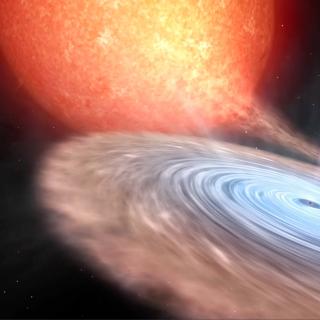Bibcode
Grisé, F.; Kaaret, P.; Corbel, S.; Cseh, D.; Feng, H.
Referencia bibliográfica
Monthly Notices of the Royal Astronomical Society, Volume 433, Issue 2, p.1023-1038
Fecha de publicación:
8
2013
Número de citas
39
Número de citas referidas
39
Descripción
NGC 5408 X-1 is a well-studied ultraluminous X-ray source (ULX) that has
been seen to emit in X-rays persistently above the Eddington limit of a
stellar mass black hole for years. In this paper we report on the most
extensive X-ray monitoring of a ULX, using more than 4 yr of
observations from the Swift satellite. We find that the 115 d
periodicity reported by Strohmayer disappeared after only a few cycles,
confirming the suspicion of Foster et al. that the periodicity is most
likely superorbital and not the orbital period of the system. We also
report on a clear dipping behaviour of the source that may be related to
a (super)orbital phenomenon. All these features are reminiscent of
Galactic X-ray binaries and strengthen their link with ULXs. Deeper
observations of a dip could help resolve the ambiguity about the
interpretation of the spectral components of ULXs.
Proyectos relacionados

Agujeros negros, estrellas de neutrones, enanas blancas y su entorno local
Los agujeros negros y estrellas de neutrones en binarias de rayos-X son laboratorios únicos para explorar la física de estos objetos compactos. No solo permiten confirmar la existencia de agujeros negros de origen estelar a través de mediciones dinámicas de sus masas, sino que también permiten investigar el comportamiento de la materia y la
Montserrat
Armas Padilla